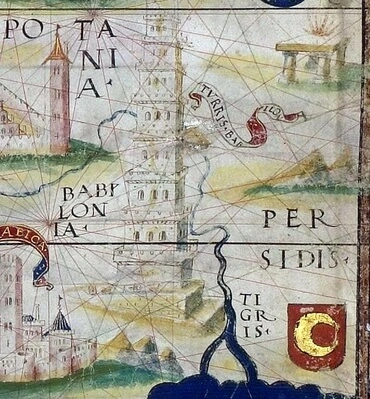1
Et toi prononce à haute voix une complainte touchant les Principaux d'Israël.
2
Et dis : qu'était-ce de ta mère? C'était une lionne [qui] a gîté entre les lions, et [qui] a élevé ses petits parmi les lionceaux.
3
Et elle a fait croître un de ses petits, qui est devenu un lionceau, et qui a appris à déchirer la proie, tellement qu'il a dévoré les hommes.
4
Les nations [en] ont ouï parler, il a été attrapé en leur fosse; et elles l'ont emmené avec des boucles au pays d'Egypte.
5
Puis ayant vu qu'elle avait attendu, [et] que son attente était perdue, elle a pris un [autre] de ses petits, et elle en a fait un lionceau;
6
Qui marchant parmi les lions [est] devenu un lionceau, et a appris à déchirer la proie tellement qu'il a dévoré les hommes.
7
Il a désolé leurs palais, et il a ravagé leurs villes, de sorte que le pays, et tout ce qui y est, a été épouvanté par le cri de son rugissement.
8
Et les nations ont été rangées contre lui, de toutes les Provinces, et elles ont étendu leurs rets contre lui; il a été attrapé en leur fosse.
9
Puis ils l'ont enfermé et enchaîné, pour l'amener au Roi de Babylone, et le mettre en une forteresse, afin que sa voix ne fût plus ouïe sur les montagnes d'Israël.
10
Ta mère était en ton sang comme une vigne plantée auprès des eaux, et elle est devenue chargée de fruits et de rameaux, à cause des grandes eaux.
11
Et elle a eu des verges fortes pour [en faire] des sceptres de dominateurs; et son tronc s'est élevé jusqu'à ses branches touffues, et elle a été vue en sa hauteur avec la multitude de ses rameaux.
12
Mais elle a été arrachée avec fureur, et jetée par terre; et le vent d'Orient a séché son fruit; ses verges fortes ont été rompues, et ont séché; le feu les a consumées.
13
Et maintenant elle est plantée au désert, en une terre sèche et aride.
14
Et le feu est sorti d'une verge de ses branches, et a consumé son fruit, et il n'y a point eu en elle de verge forte [pour en faire] un sceptre à dominer. [C'est] ici la complainte, et on s'en servira pour complainte.







